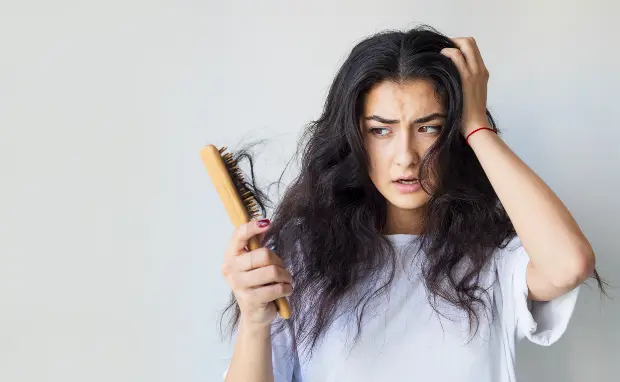Key points
- Hair loss affects 4-5% of Zepbound users
- The shedding typically starts 2-4 months after treatment begins
- Eating enough protein and a balanced diet can help prevent nutritional deficiencies that can worsen hair loss
- Zepbound hair loss can be reversed once weight stabilizes and nutrition improves
You've probably seen the dramatic before-and-after photos. The life-changing results from Zepbound (tirzepatide) can be significant. But nobody warned you about finding clumps of hair on the floor.
As you lose weight with Zepbound, are you losing hair as well? You’re not imagining it. About 1 in 20 Zepbound users face this issue. And women experience it far more frequently.
Here's what's actually happening to your hair, and what you can do about it.
Does Zepbound cause hair loss?
Yes, hair loss can occur in some people taking Zepbound. Clinical studies show this side effect in 4-5% of users.
This side effect appears more frequently in women (7.1%) than in men (0.5%). However, the hair loss was not severe enough to cause people to stop treatment. For example, none of the people in clinical trials stopped taking Zepbound because of hair loss.
“The hair loss with Zepbound is usually temporary and reverses once your weight stabilizes and your diet improves. Talk to your healthcare provider if you see signs of hair loss,” explains Gia Eapen, MD.
Why does Zepbound cause hair loss?
Hair loss from Zepbound stems from how your body adapts to the medication's effects. Here's what's actually happening beneath the surface.
1. Rapid weight loss
The main culprit behind Zepbound hair loss is rapid weight loss, which creates a physiological strain on your body. Your body may interpret this sudden change as a shock, similar to how it might respond to surgery or illness.
This strain could interfere with your normal hair growth cycle. Each hair on your head is on its own timeline, cycling through growth, transition, and rest. Normally, only a small percentage rest at any given time.
But the stress from rapid weight loss sends a wave of follicles into early retirement. Instead of losing 50-100 hairs daily, you're suddenly shedding much more. This synchronized shedding has a name: telogen effluvium.
2. Nutritional deficiencies
When you're taking Zepbound, your appetite drops significantly. You may end up eating less, which is great for weight loss, but it can lead to unexpected nutritional deficiencies.
For example, hair strands mostly consist of a structural protein called keratin. Without enough protein in your diet, your hair could become fragile and break easily.
Additionally, apart from protein, nutrients like Zinc, Iron, and Vitamin D can also affect hair health. If there is severe calorie restriction, the body directs available nutrients toward essential functions like maintaining vital organs and muscle tissue, leaving less energy for hair growth, nails, and other regions.
3. Medication side effects
Other Zepbound side effects compound the problem. Nausea affects 25%-28% of users, and together with vomiting, these symptoms may make it harder for you to eat. This could further deprive your body of hair-healthy nutrients.
4. Hormonal changes
Hair loss may not always be due to your medication. Hormonal shifts can also disrupt hair growth.
Thyroid dysfunction, particularly hypothyroidism, often triggers hair loss. Women in perimenopause or menopause face similar shedding due to changing hormone levels.
"Hair loss doesn't always mean your medication is to blame. Sometimes the timing is just a coincidence. Your body goes through various hormonal shifts, especially during life stages like perimenopause or menopause, and these changes can trigger hair thinning on their own. Consult your healthcare provider to pinpoint what's actually causing your hair loss, rather than automatically assuming it's the Zepbound,” explains Gia Eapen, MD.
When does hair loss start on Zepbound?
“Hair loss may begin about 2-4 months after you start weight loss on Zepbound,” notes Eapen, MD. “Since hair loss is usually triggered by the stress of quick weight loss rather than the medication itself, you may notice increased shedding after the rapid weight loss phase begins.”
Zepbound takes about a month to work, which involves reaching steady-state levels in your body. You may experience some initial weight loss after 4 weeks, but more rapid weight loss will happen only over the next couple of months.
One study found that hair loss (telogen effluvium or TE) typically occurs when people lose around 15% of their body weight at a rate of about 8 pounds per month.
What’s interesting is that women and older adults are more likely to develop telogen effluvium, even when they're losing weight at the same pace as men and younger people.
How to prevent hair loss on Zepbound?
1. Focus on diet and nutrition
A balanced diet can give your body enough nutrients needed to maintain healthy hair growth.
- Focus on whole foods rather than processed options.
- Make protein a priority at every meal. Good sources include lean meats like chicken and turkey, fish and seafood, eggs, Greek yogurt, legumes like lentils and chickpeas, tofu and tempeh, and protein powders for smoothies.
- Include plenty of leafy greens for iron and B vitamins, nuts and seeds for zinc and healthy fats, colorful vegetables for antioxidants, whole grains for B vitamins and fiber, and fatty fish for omega-3 fatty acids.
💡Tip: Pair iron sources with vitamin C to increase iron absorption. A simple way is to squeeze a little lime on your meal or add orange slices to a spinach salad.
"Zepbound works by making you feel less hungry, but that doesn't mean your nutritional needs disappear,” explains Rita Faycurry, RD, Registered Dietitian. “Consider consulting a registered dietitian experienced with weight loss medications. They can create a personalized meal plan designed to give you the nutrition you need, despite your reduced appetite and side effects of medication.”
2. Work with your healthcare provider
"Regular check-ins with your healthcare provider are essential for monitoring progress and addressing concerns quickly. If you're losing weight too rapidly or experiencing persistent side effects, your doctor can adjust your Zepbound dosage to reduce stress on your system.
Your provider can run tests to identify other causes, like hormonal imbalances or nutritional deficiencies, contributing to hair loss. Based on blood work results, they'll recommend appropriate supplements if needed.
'Never self-prescribe supplements. Taking what you don't need can cause imbalances and potentially harm your health,' says Eapen, MD."
3. Practice stress management techniques
Manage stress through deep breathing exercises, regular physical activity, adequate sleep (7-9 hours nightly), and relaxation techniques like meditation or yoga.
Final thoughts
Hair loss on Zepbound can feel discouraging, especially when you're working hard to improve your health. Remember that this side effect is manageable and reversible for most people once the weight stabilizes and nutrition improves.
The key is following a balanced diet. Eat enough protein and nutrient-rich foods, even when your appetite is low. Work closely with your healthcare team to monitor progress and catch deficiencies early.
With the right approach, you can achieve your weight loss goals while protecting your hair health.
Frequently asked questions (FAQs)
Is hair loss common with Zepbound?
Hair loss occurs in about 4%-5% of people taking Zepbound. Women experience this side effect more frequently (7.1%) than men (0.5%).
Why do you lose hair on tirzepatide (Zepbound)?
Sudden weight loss stresses your body, which could trigger hair loss or telogen effluvium. This condition causes hair follicles to shift into their resting phase and shed all at once.
At the same time, reduced appetite can leave you short on protein, iron, zinc, and other nutrients your hair needs to grow. Together, this stress and poor nutrition disrupt your normal hair cycle, potentially leading to hair thinning.
How to tell if your meds are causing hair loss?
Signs may include more hair than usual in your hairbrush, shower drain, on your pillow, or when you run your fingers through your hair.
Hair loss typically becomes noticeable two to three months after starting Zepbound.
The timing matters because telogen effluvium doesn't happen immediately. Always discuss new hair loss with your healthcare provider to rule out conditions like thyroid problems, iron deficiency, or hormonal imbalances.
How long do Zepbound side effects last?
Most Zepbound side effects, particularly gastrointestinal symptoms like nausea and diarrhea, improve as your body adjusts to the medication. The hair loss may reduce once your weight stabilizes and nutrition improves. If side effects persist or worsen beyond expected timeframes, consult your healthcare provider.
Does Wegovy cause hair loss like Zepbound?
Yes, Wegovy can cause hair loss similar to Zepbound. In studies, about 3.3% of adults taking Wegovy experienced hair loss. Like with Zepbound, the hair loss is not directly caused by the medication. Instead, it's triggered by the rapid weight loss on Wegovy.
Both Wegovy and Zepbound work by suppressing appetite and helping you lose significant weight quickly, which can stress your body and lead to temporary hair shedding.
Boost weight loss on Zepbound with a personalized diet plan. Find a registered dietitian who accepts your insurance.
The views expressed by authors and contributors of such content are not endorsed or approved by Fay and are intended for informational purposes only. The content is reviewed by Fay only to confirm educational value and audience interest. You are encouraged to discuss any questions that you may have about your health with a healthcare provider.
Sources
- ZEPBOUND™ (tirzepatide) Injection, For Subcutaneous Use (2022)
https://www.accessdata.fda.gov/drugsatfda_docs/label/2023/217806s000lbl.pdf - Diet And Hair Loss: Effects Of Nutrient Deficiency And Supplement Use (January 31, 2017)
https://pmc.ncbi.nlm.nih.gov/articles/PMC5315033/ - Telogen Effluvium (May 1, 2024)
https://www.ncbi.nlm.nih.gov/books/NBK430848/ - Telogen Effluvium Associated With Weight Loss: A Single Center Retrospective Study (June 10, 2024)
https://pmc.ncbi.nlm.nih.gov/articles/PMC11621640/ - Is Thyroid Dysfunction A Common Cause Of Telogen Effluvium?: A Retrospective Study (January 05, 2024)
https://journals.lww.com/md-journal/fulltext/2024/01050/is_thyroid_dysfunction_a_common_cause_of_telogen.51.aspx - Wegovy Product Monograph
https://www.novonordisk.ca/content/dam/nncorp/ca/en/products/Wegovy-product-monograph.pdf











